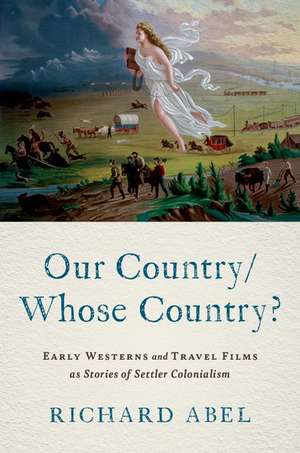Our Country/Whose Country?: Early Westerns and Travel Films as Stories of Settler Colonialism
Autor Richard Abelen Limba Engleză Paperback – feb 2024
Preț: 172.99 lei
Preț vechi: 199.85 lei
-13% Nou
Puncte Express: 259
Preț estimativ în valută:
33.10€ • 34.65$ • 27.55£
33.10€ • 34.65$ • 27.55£
Carte disponibilă
Livrare economică 26 februarie-04 martie
Livrare express 22-28 februarie pentru 51.29 lei
Preluare comenzi: 021 569.72.76
Specificații
ISBN-13: 9780197744055
ISBN-10: 0197744052
Pagini: 256
Ilustrații: 50 B&W halftones
Dimensiuni: 236 x 160 x 9 mm
Greutate: 0.38 kg
Editura: Oxford University Press
Colecția OUP USA
Locul publicării:New York, United States
ISBN-10: 0197744052
Pagini: 256
Ilustrații: 50 B&W halftones
Dimensiuni: 236 x 160 x 9 mm
Greutate: 0.38 kg
Editura: Oxford University Press
Colecția OUP USA
Locul publicării:New York, United States
Recenzii
"Settler colonialism is the elephant in the room of American film history. In this meticulously researched book, Richard Abel breathes new life into many cowboy and cowgirl films, 'Indian pictures,' and travel films that no longer exist. Most importantly, Abel rereads these films as settler colonial texts whose white supremacy, both overt and repressed, was naturalized by generic narratives, stars, and imagery that justified the actually occurring violence of Indigenous erasure to film audiences worldwide."
Notă biografică
Richard Abel is Emeritus Professor of International Cinema and Media at the University of Michigan. The most recent of his dozen books is Movie Mavens: US Newspaper Women Take on the Movies, 1914-1923 (2021). His essays have appeared in scores of journals and been translated into five languages. He received the 2014 SCMS Distinguished Career Achievement Award and the 2017 Jean Mitry Award.
